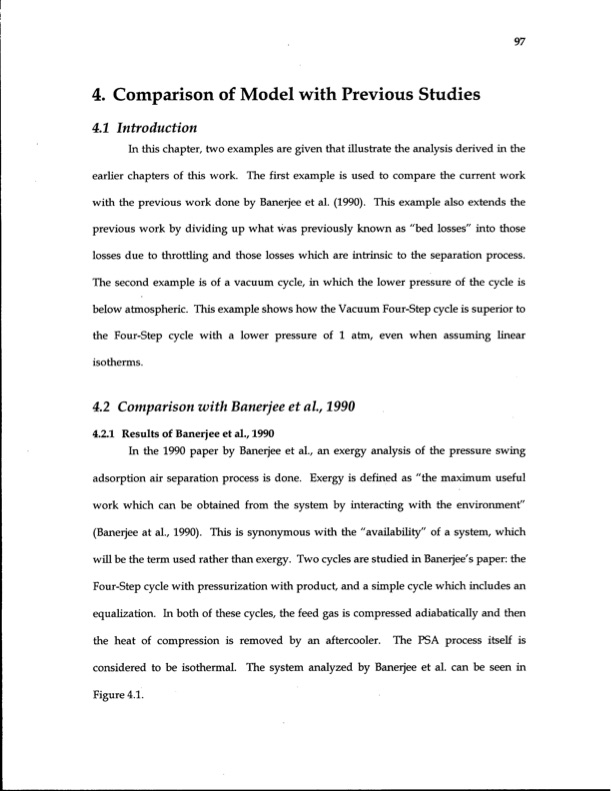
PDF Publication Title:
Text from PDF Page: 113
4. Comparison of Model with Previous Studies 4.1 Introduction In this chapter, two examples are given that illustrate the analysis derived in the earlier chapters of this work. The first example is used to compare the current work with the previous work done by Banerjee et al. (1990). This example also extends the previous work by dividing up what was previously known as "bed losses" into those losses due to throttling and those losses which are intrinsic to the separation process. The second example is of a vacuum cycle, in which the lower pressure of the cycle is below atmospheric. This example shows how the Vacuum Four-Step cycle is superior to the Four-Step cycle with a lower pressure of 1 arm, even when assuming linear isotherms. 4.2 Comparison with Banerjee et ah, 1990 4.2.1 Results of Banerjee et al., 1990 In the 1990 paper by Banerjee et al., an exergy analysis of the pressure swing adsorption air separation process is done. Exergy is defined as "the maximum useful work which can be obtained from the system by mteracting with the environment" (Banerjee at al., 1990). This is synonymous with the "availabiHty" of a system, which will be the term used rather than exergy. Two cycles are studied in Banerjee's paper: the Four-Step cycle with pressurization with product, and a simple cycle which includes an equalization. In both of these cycles, the feed gas is compressed adiabatically and then the heat of compression is removed by an aftercooler. The PSA process itself is considered to be isothermal. The system analyzed by Banerjee et al. can be seen in Figure 4.1. 97PDF Image | Energy Efficiency of Gas Separation Pressure Swing Adsorption

PDF Search Title:
Energy Efficiency of Gas Separation Pressure Swing AdsorptionOriginal File Name Searched:
ubc_1997-0009.pdfDIY PDF Search: Google It | Yahoo | Bing
CO2 Organic Rankine Cycle Experimenter Platform The supercritical CO2 phase change system is both a heat pump and organic rankine cycle which can be used for those purposes and as a supercritical extractor for advanced subcritical and supercritical extraction technology. Uses include producing nanoparticles, precious metal CO2 extraction, lithium battery recycling, and other applications... More Info
Heat Pumps CO2 ORC Heat Pump System Platform More Info
| CONTACT TEL: 608-238-6001 Email: greg@infinityturbine.com | RSS | AMP |